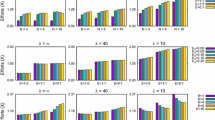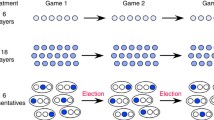Abstract
It is commonly accepted that what we ought to do collectively does not imply anything about what each of us ought to do individually. According to this line of reasoning, if cooperating will make no difference to an outcome, then you are not morally required to do it. And if cooperating will be personally costly to you as well, this is an even stronger reason to not do it. However, this reasoning results in a self-defeating, yet entirely predictable outcome. If everyone is rational, no one will cooperate, resulting in an aggregate outcome that is devastating for everyone. This dismal analysis explains why climate change and other collective action problems are so difficult to ameliorate. The goal of this paper is to provide a different, exploratory framework for thinking about individual reasons for action in collective action problems. I argue that the concept of commitment gives us a new perspective on collective action problems. Once we take the structure of commitment into account, this activates requirements of diachronic rationality that give individuals instrumental reasons to cooperate in collective action problems.
Similar content being viewed by others
Notes
E.g. Coordination problems such as the Assurance Game or Chicken.
This ontological position does not entail methodological individualism, which holds that all human activity is best explained in terms of the activity of individuals (Elster 1989). Methodological holists usually also accept the claim that all human activity is ontologically constituted by the activity of human individuals.
Nefsky (2019) raises this point in footnote 8.
By “luck”, I mean that the individual must take the right sort of action, have the right sort of personality, and ultimately, being in the right place at the right time, among other factors. For example, Greta Thunberg is one person who has had an outsize impact as a climate change activist, but even with her prominence, carbon emissions continue unabated.
There is some debate about the possibility of a vague goal. I assume that we can aim for vague goals: to be fitter, morally better, etc. See Tenenbaum and Raffman (2012) for an argument that they are possible, we aim for them all the time, and that a theory of rational choice needs to make sense of this.
The apparent reasonableness of this chain of reasoning underlies the temptation of procrastination (Andreou and White 2010).
Obviously, this case greatly simplifies how exercise works.
I thank an anonymous reviewer for pressing this objection and suggesting this example.
Thanks to an anonymous reviewer for suggesting this case.
I am simplifying the cases such that the law of diminishing returns does not crop up, since that is not a feature of the inefficacy problem. Nevertheless, it’s worth addressing what happens when we do take diminishing returns into account. One might object that most activity tends to follow the law of diminishing returns, so synchronic rationality will tell Hera to run early on when the marginal benefits are high. Assume that the activity in question does follow this law. Here, synchronic rationality is still insufficient—there is no guarantee that it will tell Hera to run when marginal benefits begin to level off. At that point in the curve, it’s possible that the marginal costs of running will exceed the marginal benefits at each point, even if continuing to run is necessary to achieve her overarching goal. I thank an anonymous reviewer for prompting me to address this point.
This case is constructed with a layperson’s understanding of gymnastics, with apologies to those who know better.
See Nguyen (2019) for an overview of the implications of game-playing for practical rationality.
This response may help to address a separate objection that my view is too demanding and would force us to be “moral saints” (Wolf 1982) on pain of irrationality. I thank Leif Wenar for this objection.
References
Andreou, C. (2006). Environmental damage and the puzzle of the self-torturer. Philosophy and Public Affairs, 34(1), 95–108.
Andreou, C., & White, M. (Eds.). (2010). The thief of time: Philosophical essays on procrastination. Oxford: OUP.
Bicchieri, C. (2005). The grammar of society: The nature and dynamics of social norms. Cambridge: Cambridge University Press.
Bratman, M. (2003). A desire of one’s own. Journal of Philosophy, 100(5), 221–242.
Bratman, M. (2007). Temptation revisited. Structures of Agency. Oxford: OUP.
Bratman, M. (2012). Time, rationality, and self-governance. Philosophical Issues, 22, 73–88.
Bratman, M. (2018). Planning, time, and self-governance: Essays in practical rationality. Oxford: OUP.
Broome, J. (2019). Against denialism. The Monist, 102(1), 110–129.
Budolfson, M. B. (2019). The inefficacy objection to consequentialism and the problem with the expected consequence response. Philosophical Studies, 176(7), 1711–1724.
Elster, J. (1989). Nuts and bolts for the social sciences. Cambridge: Cambridge University Press.
Frankfurt, H. (1971). Freedom of the will and the concept of a person. Journal of Philosophy, 68, 5–20.
Gilbert, M. (2006). Rationality in collective action. Philosophy of the Social Sciences, 36(1), 3–17.
Hardin, G. (1968). The tragedy of the commons. Science, 162(3859), 1243–1248.
Kagan, S. (2011). Do I make a difference? Philosophy and Public Affairs, 39(2), 105–141.
Kingston, E., & Sinnott-Armstrong, W. (2018). What’s wrong with joyguzzling? Ethical Theory and Moral Practice, 21(1), 169–186.
Kolodny, N. (2008). The myth of practical consistency. European Journal of Philosophy, 16(3), 366–402.
Kruse, K. M. (2013). White flight: Atlanta and the making of modern conservatism. Princeton: Princeton University Press.
Lomasky, L., & Brennan, G. (1997). Democracy and decision: The pure theory of electoral preference. Cambridge: Cambridge University Press.
Massey, D., & Denton, N. A. (1993). American apartheid: Segregation and the making of the underclass. Cambridge: Harvard University Press.
Millgram, E. (2015). The great endarkenment. Oxford: OUP.
Nefsky, J. (2011). Consequentialism and the problem of collective harm. Philosophy and Public Affairs, 39(4), 364–395.
Nefsky, J. (2017). How you can help, without making a difference. Philosophical Studies, 174, 2743–2767.
Nefsky, J. (2019). Collective harm and the inefficacy problem. Philosophy Compass, 14(4), e12587.
Nguyen, C. T. (2019). Games and the art of agency. Philosophical Review, 128(4), 423–462.
Norcross, A. (2004). Puppies, pigs, and people: Eating meat and marginal cases. Philosophical Perspectives, 18, 229–245.
Parfit, D. (1984). Reasons and persons. Oxford: OUP.
Quinn, W. S. (1990). The puzzle of the self-torturer. Philosophical Studies, 59(1), 79–90.
Schroeder, M. (2007). Slaves of the passions. Oxford: Oxford University Press.
Singer, P. (1980). Utilitarianism and vegetarianism. Philosophy and Public Affairs, 9(4), 325–337.
Sinnott-Armstrong, W. (2005). It’s not my fault: Global warming and individual moral obligations. Perspectives on climate change: Science, economics, and ethics. Amsterdam: Elsevier.
Tenenbaum, S., & Raffman, D. (2012). Vague projects and the puzzle of the self-torturer. Ethics, 123(1), 86–112.
Tullock, G. (1971). The paradox of revolution. Public Choice, 11(1), 89–99.
Author information
Authors and Affiliations
Corresponding author
Additional information
Publisher's Note
Springer Nature remains neutral with regard to jurisdictional claims in published maps and institutional affiliations.
Rights and permissions
About this article
Cite this article
Soon, V. An intrapersonal, intertemporal solution to an interpersonal dilemma. Philos Stud 178, 3353–3370 (2021). https://doi.org/10.1007/s11098-021-01604-5
Accepted:
Published:
Issue Date:
DOI: https://doi.org/10.1007/s11098-021-01604-5




